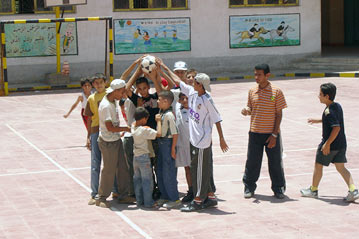The Iraqi government is encouraging the return of refugees from Middle Eastern countries by laying on free flights, but a group of over 100 Iraqi and international non-governmental organisations (NGOs) has issued a statement warning of the dangers.
"A rushed and premature return process would have disastrous consequences both for the displaced and for the stability of Iraq," said the 8 August statement.
"Violence is still widespread, and basic services such as access to healthcare, clean water or adequate shelter are unavailable in many parts of the country," it said, adding that the situation in Iraq was still not conducive to the return of refugees and internally displaced families.
Dozens of Iraqi refugees in Egypt recently returned to Iraq, with their travel expenses paid by the Iraqi government. The move was designed to encourage the return of refugees, an Iraqi official said on 11 August.
"Since last year we’ve managed to achieve remarkable security gains. This should help Iraqi displaced families and refugees to return to their homes and lead normal lives," said Maj-Gen Qassim al-Moussawi, the Iraqi military spokesman for Baghdad, as he greeted about 250 Iraqi refugees at Baghdad International Airport.
Al-Moussawi said the government hoped to arrange up to two flights a week for returnees from countries around the region.
At the airport, some of the returnees said they were returning because their savings had run out; others said they had been ill-treated and had no rights in the host countries.
"It has become hard to continue living abroad," said Abdu Hussein, a 40-year-old father-of-three, who left for Egypt in late 2006 due to the deteriorating security situation in Iraq.
"I ran out of money to feed my family and meet their needs and it was hard to find decent work there because of my legal status, and that is why we came to the conclusion that it would be better to return to Iraq, despite the fragile security here," he said.
The NGOs called on the Iraqi and US governments, and regional countries, not to encourage the return of refugees to Iraq "until conditions are met for a voluntary, safe and sustainable return process".
sm/ar/cb
This article was produced by IRIN News while it was part of the United Nations Office for the Coordination of Humanitarian Affairs. Please send queries on copyright or liability to the UN. For more information: https://shop.un.org/rights-permissions




